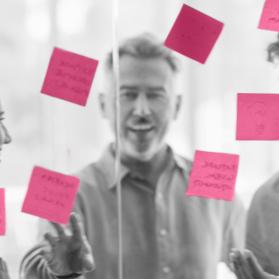By 2030, DB Cargo wants to transport around 25 million of today's truck trips by rail. Freight transport by rail is to increase its market share from 19 to 25 percent by then. To achieve this, one of the leading global logistics service providers is relying on digitization, automation, flexible as well as individualized transport services and an express train network.
Whether single wagon, block train, own siding or transshipment facilities at the Railport: customers' requirements for the transport of their goods and merchandise vary greatly. And to ensure that customers always know where their shipments are at any given moment, DB Cargo has equipped its freight cars with GPS and sensor technology. Iris Hilb, responsible for the Customer Service Center, Wagon Management and IT Sales at DB Cargo, on working for and with customers.
Detecon: In this year, which has been plagued by the pandemic, DB Cargo has set its sights on the future. In the middle of the second lockdown, you have signed a ten-year contract with the steel manufacturer ArcelorMittal for the supply of raw materials. A lot seems to fit?
Iris Hilb: We have set ourselves the goal of developing into the leading European rail logistics company. And we are doing this with the core of our European rail network, which sets us apart from almost all other logistics service providers.
We want to organize logistics chains door-to-door for our customers and are convinced that this will not only enable us to expand existing customer relationships but also win new customers - including those who do not have a rail connection.
Politicians also want to move more goods from road to rail. Is this already having an impact on your business today?
For some time now, we have been registering a significantly higher interest in transport by rail, which is due to the rightly intense climate debate. Many customers or industries are now looking at the idea of transporting more goods by rail or switching to rail for the first time. A good example is the consumer goods industry, which has relied heavily on truck transport to date.

Your contact for Nordics Railway
We will present our offer in the field of digitalisation of rail operations at the Scandinavian Rail Optimisation Event in Stockholm on 9 November 2022.
Talk with our expert now:
Tim Herbstrith, Manager
mail: tim.herbstrith@detecon.com
phone: +43 1 50413000
Doesn't that ultimately mean that you make your services more flexible and respond more to customers' individual requirements?
The customer is the focus. Customers and industries have different requirements, which are at the heart of what we do. Here are a few examples:
In customer service, we have consistently implemented "one face to the customer" and invested in personal support for customers in day-to-day business. Competent contact persons who are very familiar with the customers' logistics network are on hand. This enables us, for example, to find the right solution for the customer in the event of problems or disruptions.
Our product range must also provide good answers to market requirements. We want to get new customers off the street, and that's where having the right logistics offering comes in. To offer competitive transit times, we want to strengthen single-wagon transport and build up express door-to-door offerings. This will also bring us a big step closer to our goal of becoming a European rail logistics provider, i.e., doing more than just rail transport - a total transport service from start to finish.
What role does digitization play in this?
Digitization and automation help us a great deal. Automation creates efficiency. In our wagonload operations, for example, 85 percent of all customer orders are already fully automated when they reach our plant, which then uses them to transport the consignments to their destination. So here we have already covered a large part of the distance. We will also implement this in combined transport.
Digitization also enables us to digitalize interactions with our customers in our day-to-day business and to launch e-services with added value for our customers. This is what link2rail stands for. Here, too, the focus is on the logistics requirements of our customers and the individual industries. For example, there is an industry solution for the recycling sector, which we are continuously developing with our customers. These e-services also help with day-to-day processes such as booking, transport monitoring, shipment tracking and billing. And there are useful applications for all aspects of freight transportation, such as the network map, rail access point search, timetable information, or the freight car catalog.
In addition, digitization is suitable for better managing our European network. The aim here is to provide data at an early stage so that, for example, faults can be identified earlier, and solutions can be sought in the interests of our customers.
What exactly does digitization improve in the European network?
There are two main areas where we are getting better. First, we are closing information gaps, "white spots," in Europe. If information about backlogs and disruptions is missing at any point in the European logistics chain, you lose important time. Based on GPS data, for example, we detect such situations earlier and manage logistics chains better.
Second, we clean up information asymmetries in processes. One example: In Europe, a very large number of participants in a logistics chain often have to work together across several countries. Sharing information about disruptions in this chain is extremely important. Knowing that something is not running smoothly at the start of a shipment gives all the players more leeway to find an alternative solution for the shipment and avoid problems for our customers' logistics.
What role does the Customer Lab in Duisburg play in digital transformation?
Digitization cannot be an end in itself, but should have something to do with our business, i.e. generate a customer benefit. In the Customer Lab, we work with customers to develop digital solutions that meet a specific requirement of that customer. With this tool, wagon fleets can be planned and scheduled digitally. This gives the customer transparency over all the wagons and allows him, for example, to schedule wagons online for the next loading and order the next assignment with just a few clicks.
Your core fleet of around 63,000 wagons is now largely networked and transmits its current locations via GPS. What significance does data have for your business?
That was an important milestone. The GPS and also sensor data provide essential information for our digital offerings to customers and for control tools in our network. In addition to these new data sources, we have a huge wealth of data from various other sources, such as IT inventory systems or data platforms in the rail sector.
However, data alone is only of limited help. The trick is to intelligently link all data sources and use them to generate control-relevant events for customers and ourselves. In this way, we can further expand our link2rail services and increase the added value for our customers. One important example is our Track&Trace service, which enables our customers to monitor their shipments and identify delays at an early stage.
So you didn't have an overview of your wagon fleet in the past?
In the past, it wasn't easy in some areas. Especially when the wagons were abroad. With GPS, we have that under control today. The technology closes our blind spots in the European network. GPS data therefore offers an upgrade for our data world.
Are customers also involved in the data flow?
We can connect our customers' systems directly to our systems via API interfaces. The customer then gets their information directly into their in-house system and can make better use of this data for themselves. In addition, the employees in customer service and in our Operations Center have the same information situation. This means they can act quickly in the event of disruptions. This is a major advantage, especially for time-critical shipments. This is also where our personal customer service comes in and develops solutions with customers that are tailored to their logistics.
Do you also use artificial intelligence to analyze the data?
We use AI prognostics for ETA (Estimated Time of Arrival) determination, where a lot of real-time data is important for a good forecast. We have had an AI training factory live for just over a year, which we feed with real-time data. We combine that with "natural intelligence" by leveraging the expertise of our dispatching professionals. Among other things, they are very good at assessing what data we might still need for AI, and they can also assess whether the AI results are really fit for practice. This is another milestone for our customers, but also for our own control tasks in the network.
The Corona pandemic has also put existing processes to the test. Are there any things that have changed - positively or negatively - for DB Cargo as a result of Corona?
We were faced with a major task during the first lockdown in spring 2020. We have around 1,000 colleagues working in our customer service department in Duisburg, taking care of day-to-day business such as order processing and incident management. They had to do a lot of their work from the home office in a very short time, a feat that worked extremely well. In some places, we were even able to work more efficiently. We will be incorporating some things into our daily routine on a permanent basis, for example via new home office arrangements.
But what we all miss, and what we can only do digitally to a limited extent, is direct customer contact, for example in our Customer Lab in Duisburg. We invite customers there, work together on their business processes and develop digital solutions for our link2rail service platform. Customers' requirements can be translated into new services in a digital factory. Such workshops are difficult to conduct virtually.
Suppose there were the "fairy godmother" of rail freight: What would you wish for?
My first wish is for something non-digital, namely to have personal contact with our customers and colleagues again. This is what our business thrives on and also the further development of link2rail. We have set ourselves a lot of goals in this area for the coming year.
Another wish is that we continue to drive forward innovations in rail freight transport. This includes, for example, an innovation in our freight cars - our new modular and multifunctional freight car (m2), which we will be launching next year. Our specialized wagon fleet will be separated into carrying wagons and containers, as in combined transport - also for heavy goods. This topic is in its infancy but has the potential to fundamentally change our business. It will enable us to fulfill an old wish to use wagons across all sectors and thus make better use of capacity.
All these innovations, whether digital or in our assets, contribute significantly to our competitiveness and thus to increasing rail freight traffic.
About: Iris Hilb
A graduate in business administration, Iris Hilb has been with DB Cargo for 25 years and has been in sales from the beginning. The positive environmental aspect of rail transport was an important motivating factor for her to join DB Cargo. Today, Iris Hilb manages a cross-sectional area for all sales teams and ensures that the teams are successful in the market. This includes operational customer service with the customer center in Duisburg, where all order processing, including incident management, comes together. In addition, there is the DB Cargo wagon fleet, which is considered a sales task, as scheduling has a major influence on sales and customer satisfaction.







